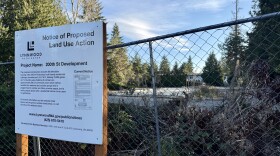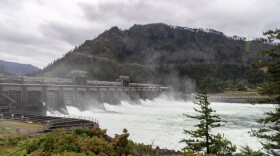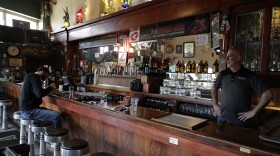Neatly trimmed hedges and green Astroturf lawns line the winding streets at Cascade Park Estates in Southeast Vancouver. But the tidy façade in mobile home communities like this one hides the stress of some older residents who worry about being priced out of one of the few places they can afford to live.
Sharon Pevey, 77, moved to Cascade Park Estates seven years ago. She was divorced and needed a place to live quickly. She paid $140,000 cash to buy her pale yellow, 1,400-square-foot mobile home. As with most manufactured home parks, she had to pay rent for the lot her home sat on, priced at $525 per month, plus property taxes. It was expensive but she could manage since she runs a hair salon across the river in Portland.
Soon after she moved, the rent increases started. They climbed each year, and today she pays $1,350 each month “for a piece of dirt that this house sits on,” Pevey said.

“I saved up and everything. I worked all my life,” she added. “But when we have no idea what the rent increases are going to be, how can you plan for that? You can’t.”
Pevey is lucky. Her business gives her more security than some neighbors.
“The other people here that already have health problems, they’re just sick,” she said. “They don’t know what they’re going to do.”
Manufactured home parks have undergone a national trend in recent years, shifting from the hands of small landlords to real estate investment trusts or owners who buy up numerous parks and increase rents. The tenants of those parks, often seniors living on fixed incomes, are left with little choice but to pay because in Southwest Washington — as with many areas in the Northwest — affordable housing is increasingly hard to find.
The most vulnerable homeowners
While the typical renter in an apartment or house can look for a new place to live if costs increase too much, manufactured home owners have few options. Despite being called mobile homes, they’re essentially permanent and have to be sold before their owner can move. But with a shortage of affordable housing in Southwest Washington, many seniors are effectively trapped.
“People are upset here but they feel like they’re going to have to stay here, like they don’t have a choice. And in a lot of cases, they don’t,” Irene Baker said.
Baker lives at Battle Ground MHC in a house with her sister, both of whom are on Social Security. They’ve lived in the park for eight years, but in the two years since it was purchased by GSC Investments, the costs for rent and utilities have gone from $450 to $946 per month. She said most people she knows in the park are struggling to continue paying.
“You’re gonna have an awful lot of old people out on the street. Not everybody has family to move in with,” Baker said.
OPB spoke to more than a dozen residents at five manufactured home parks in Clark and Cowlitz counties. All shared similar concerns about rent hikes.
According to Peter Van Nortwick, who has been the Clark County assessor for the past 15 years, mobile home owners are “the most vulnerable section of the homeowners market.” He’s seen 19 manufactured home parks sold in Clark County in the last five years, and he’s heard from residents whose rent immediately increased after the communities were sold. At the same time, their home values decreased.
“We would go in and assess properties and they would have a higher value,” Van Nortwick said. “Then you’d see a park owner come in, buy the park, raise the rents and then all of a sudden we’d see the values kind of drop a little bit as the market kind of readjusts for that raising rent.”

Just north of Vancouver, Woodland Park East is another 55-and-older manufactured home park. Robin Zorich and her husband moved in seven years ago. Both are on Social Security. Zorich’s husband uses a wheelchair and is on dialysis. They downsized from their house in Vancouver, where they’d lived for 20 years, because it was easier to get around in a single level home.
Their rent has gone up every year, rising from $610 when they purchased the home in 2017 to $1,300 per month. These days, they’re cutting costs to make the payment.
“Mentally, emotionally, it’s tough. When you have to worry about paying for medication. Because we’re all older,” Zorich said. “You limit your groceries and you limit pretty much everything. You know, this is supposed to be our golden years.”
Like Pevey, the Cascades Park Estates resident, Zorich volunteers with the advocacy group Washington Association of Manufactured Home Owners. Ideally, she’d like to live in a tenant-owned park. The nonprofit ROC Northwest helps residents form cooperatives to buy their parks when they’re put up for sale, but that can cost millions and is an unrealistic goal for many who are just trying to stay afloat. For now, Zorich is focused on advocating for legislation in Washington that could bring some sense of stability to her community.
Protections for tenants
Both Oregon and Washington have housing shortages. Nationally, the population of older adults who are homeless is growing. This is partly because people who are currently homeless are getting older, but a lack of affordable housing is also leaving fewer options for older Americans on a fixed income.
According to a 2023 report from the Joint Center for Housing Studies of Harvard University, “In 2021, nearly 11.2 million older adults were cost burdened, meaning they spent more than 30 percent of household income on housing costs, an all-time high and a significant increase from the 9.7 million recorded in 2016.”
Amid these trends, lawmakers in both states are considering bills to prevent excessive rent increases.
In Oregon, HB 3054 is designed to limit rent increases at manufactured home parks and in marinas, where tenants own their home, but rent the space where they’re located. The legislation would lower the current limit that can be charged each year from about 10% to a capped increase in line with the Consumer Price Index, a measurement of national inflation that was 2.9% in 2024, according to the U.S. Bureau of Labor Statistics. The legislation would also cap how much park owners can increase rent when someone buys a home within their park. That increase would be capped at 10% of what the previous owner was paying.
Washington lawmakers are considering a broader bill. HB 1217 is aimed at stabilizing prices for renters in all housing types. It would set a 7% annual limit on rent increases. The rent cap would not apply to new construction for 10 years after it was built, a detail meant to address concerns that restricting landlords’ ability to raise rent will drive construction to other states. Landlords would also have to give most tenants six months notice for rent and fee increases that are 3% or more of what they currently pay.
“It’s not saying that once rent has been established it can never change. That is not what we’re talking about,” said Washington Rep. Mia Gregerson, D-SeaTac, one of the bill’s sponsors. “We’re talking about every year or when there’s a new lease, then the landlord has a choice, but the choice that they have has to be within a framework.”
Sen. Paul Harris, R-Camas, said he hasn’t decided if he’ll support the Washington rent stabilization bill, but he acknowledged that manufactured home parks create a unique set of challenges. Harris chose not to move an elderly family member into a park in Vancouver because tenants have so little control over rent hikes.
“I would handle manufactured housing completely different than I would handle apartments or rentals in general,” Harris said. “Those people actually own the structure. What they don’t own is the land beneath them. I think we ought to take a look at that and regulate that differently.”
Venture capital vs. mom-and-pop landlords
The corporations that have purchased manufactured home parks in Southwest Washington in recent years range from individuals to large real estate investment firms.
They include Hurst and Son LLC, which owns 60 parks in Washington, according to the attorney general’s office. Hurst and Son recently reimbursed tenants across the state more than $5.5 million for improper rent and fee increases after a 2024 investigation by the AG’s office.
The 170-unit Cascade Park Estates where Pevey lives is owned by Michael and Denise Werner. The couple owns at least five manufactured home parks in Washington and Oregon, as well as a number of RV parks, according to state business records.
Both Hurst and Son and the Werners did not respond to phone and email interview requests.
GSC Investments owns about 40 communities in the Pacific Northwest, including Battleground MHC. They frequently partner in Washington with Crow Holdings Realty, a national real estate investment firm owned by billionaire investor Harlan Crow.
GSC co-owner Jake Bond attributed the rent increases at his manufactured home communities to inflation, increasing insurance costs and property taxes.
“I recognize that it’s very challenging for the tenants. It’s certainly been very challenging for us,” Bond said. “We feel like we spend the vast majority of our time as it relates to the management of these properties just combating expenses and trying to come up with creative ways to do more with less.”
Bond said he wants residents’ home values to increase as his company invests in the communities. GSC tries to limit rent increases, he said.
“If we’re not able to keep up with the cost increases that are continuing to come our way, we’re not going to be able to do that, because we’re not going to be able to make investments back into the property that are going to maintain the quality that the property and our residents deserve,” he said.
Bond said Oregon’s rent cap proposal tied to the Consumer Price Index wouldn’t allow landlords to keep up with maintenance costs. He described Washington’s higher proposed cap as less of a problem, but he worries it could be lowered more in the future.
Smaller manufactured home park landlords argue they’re not a problem in the same way as investors. But they also say more rent caps could backfire by preventing small owners from being able to keep up with costs. The result: forcing them to sell to large investors.
“The real issue isn’t small landlords. It’s the [real estate investment trusts],” said Jennifer Bagshaw, speaking against HB 3054 in Salem in early February. Bagshaw owns a 180-unit manufactured home park in Medford that has been in her family for six decades.
“I urge you to pursue targeted solutions to address their abuses rather than penalizing family-owned businesses like mine,” she said.
Lack of transparency
Doug and Lynn Maas own a two-bedroom house at Idylwood manufactured home park in Vancouver. The couple has lived there since 2016 when they inherited it from Doug’s father. Lynn is a retired nurse and Doug is a former city of Vancouver police chief. In retirement he keeps busy by investigating cold case murders with the sheriff’s office. They rarely had rent increases until 2021 when the park was purchased by GSC Investments. In the past five years, the rent for their lot has increased 94%.

Doug Maas said what’s worse is there’s virtually nothing in the park to justify the annual 15-20% rent hikes. The streets, sidewalks and utilities are owned or managed by the city of Vancouver, he said. Residents pay their own property taxes. The only shared infrastructure is a fence surrounding the houses and a trash can for dog waste.
“What bugs me here is just the lack of transparency,” Maas said “They claim the reason for nearly 100% increase over a five year period is because of these factors. But they won’t give us the data. Show me this capital budget because there is none.”
Instead of a budget, Maas said he’s only received vague reasons for the increases, such as the cost of materials and labor, and anticipated future costs. Ordinarily, Maas said, he’s sympathetic to business owners.
“They’re the ones who make the investment and they deserve a profit – a fair profit. Not an exorbitant profit because we’re trapped,” he said.
Maas said he’s concerned for his neighbors who are living “right on the edge.” He hopes the Washington bill to cap rent increases will pass this year and give his community some form of protection. In the meantime, they learned the trend could continue. A few months ago, the park was put up for sale again.
Copyright 2025 Oregon Public Broadcasting






